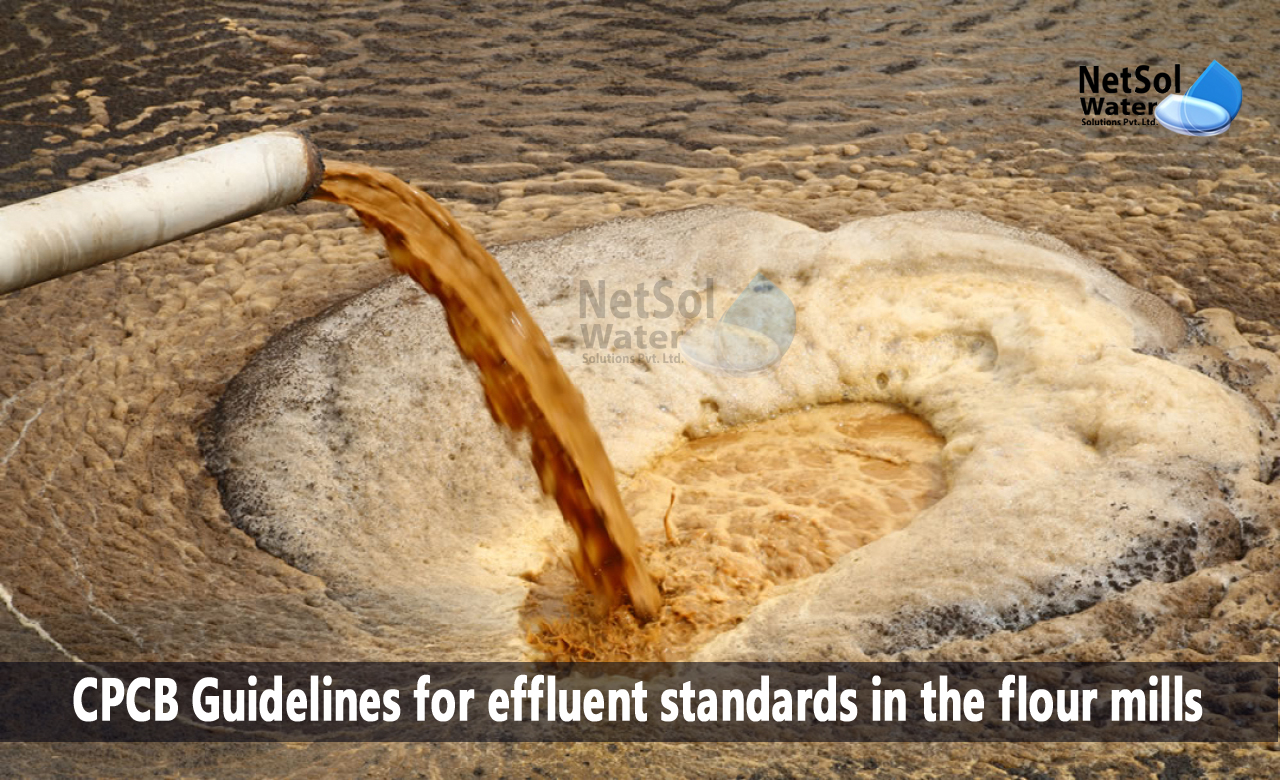The water consumption and pollution of traditional wheat washing machines, however, have become more prominent in some countries with improved environmental protection requirements for businesses, and this has a serious negative impact on the profitability and survival of flour processing businesses. As a result, in recent years, research into wheat cleaning water-saving technologies and apparatuses has increased.
But, there are certain guidelines for the effluent treatment plants in the flour mills as per CPCB. Let’s discuss these in detail.
Water requirements in flour mills
The major steps in wheat milling technology are cleaning, grinding, screening, and purifying. Large flour milling operations typically employ dry cleaning since it uses less water, produces less pollution. Although, the surface dust, microorganisms, eggs, insect pests, disease grains, sediment, and dust embedded in the abdomen, are less cleaned by dry washing than by wet cleaning. Therefore, it is challenging to make high-quality flour.
Wet cleaning has the ability to remove more than 80% of the diseased wheat and pesticide residue, bleach out shrivelled wheat with no culinary value, erase part of the wheat's epidermis during the drying process, and dampens it. The newly constructed flour processing businesses, particularly the small and medium businesses, have re-enabled the wheat washing machines and wet cleaning technologies, based on wheat washing machines due to the increase of flour quality standards.
Sources of Water pollution at the flour mills
Water pollution sources at the treatment plant are:
• Dried water kept in storage
• Systemic dead ends
• Post-RO contamination in storage containers and delivery system
CPCB Guidelines for the effluent standards in the flour mills
|
Grain processing, flour mills, paddy processing, pulse making, grinding mills |
Effluent standards (Limiting value of concentration in mg/l except for pH) |
|
|
|
|
Inland surface |
Public sewer |
Land for irrigation |
|
pH |
5.5-9 |
|
|
|
Suspended solids |
100 |
600 |
200 |
|
Oil and grease |
10 |
20 |
10 |
|
BOD |
30 |
350 |
100 |
|
COD |
250 |
|
|
Water use in the milling industry
• Cleaning of milling machinery and apparatus.
• Cleaning or wetting the raw materials.
• Cleaning tasks: hand washing, using the restrooms, bathing, and clock rooms.
• As a component of household maintenance.
Water usage requirements in flour mills
• Potable water that complies with drinking water standards.
• At least once each year, water must be tested for compliance.
• Water used to handle, wash, or otherwise prepare food must not include any contaminants, or hazards that could make the completed food product unhealthy.
• To prevent access by animals, birds, bugs, and other foreign materials, storage tanks and water pipes must be covered and constructed of non-toxic, corrosion-resistant material.
• Pipes used for non-potable water must be differentiated from those used for potable water, and must only be utilised for non-food uses.
Water treatment process in the flour mills
Sediments as solid waste and wastewater from the washing and filtration processes, are the two different types of wastewater produced, by the flour business.
If effluent from the manufacturing process is dumped into bodies of water without being treated, it could contaminate the air, surface water, groundwater, and farmland's soil. Water bodies in the industrial area are polluted, and the circumstances of the river are no exception.
ETP Modular Operations in flour mills
Given that ETPs operate in a modular manner, it makes sense to develop or build the ETP in smaller units, which can be used in accordance with the load or occupancy of people. The occupancy in the early phases of significant projects, where a higher capacity of ETPs is required is insufficient to meet the operational requirements of the ETP. Therefore, the element needs to be taken into account throughout the design stage.
Effluent Treatment Plant manufacturers for flour mills
Netsol Water provides the best wastewater treatment in India, thanks to its numerous installations in various sectors. We are aware of the demands and the characteristics of the effluent that the sector produces. We therefore create a wastewater treatment system that is unique to each need. For the greatest technologies and solutions for specialized industries, you can rely on us.
We provide first-rate effluent treatment and recycling technology that change, to meet our customers' changing needs.
Netsol Water is Greater Noida-based leading water & wastewater treatment plant manufacturer. We are industry's most demanding company based on client review and work quality. We are known as best commercial RO plant manufacturers, industrial RO plant manufacturer, sewage treatment plant manufacturer, Water Softener Plant Manufacturers and effluent treatment plant manufacturers. Apart from this 24x7 customer support is our USP. Call on +91-9650608473, or write us at enquiry@netsolwater.com for any support, inquiry or product-purchase related query.



